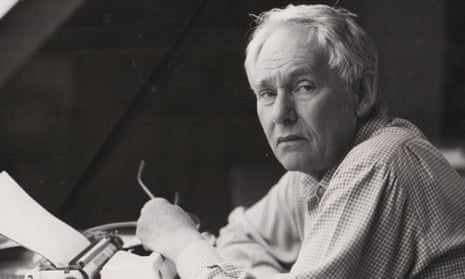John Bowen, who has died aged 94, virtually abandoned his career as a novelist in the 1960s to concentrate on writing for TV, and made his biggest impression with horror plays and ghost stories. Bowen’s first significant TV work, dubbed “folk horror” and considered his screen masterpiece, was Robin Redbreast, broadcast in the BBC’s Play for Today strand in 1970.
It tells the story of a television drama script editor, Norah Palmer (played by Anna Cropper), seeking to get over the break-up of a relationship by leaving London and her middle-class media friends to start a new life in the country.
She encounters eccentric villagers, begins to feel isolated and becomes pregnant by a man who practises martial arts in the woods. She comes to believe she is the object of a conspiracy as her phone line is cut and her car tampered with.
The tale was inspired by a late-60s resurgence of interest in paganism and witchcraft and also by the 1945 murder of a farm labourer reputedly left with a cross carved in his chest – a killing that was an influence on David Pinner’s 1967 novel Ritual, later adapted as the 1973 film The Wicker Man.
Robin Redbreast continued the story of Norah Palmer that had begun in Bowen’s 1964 novel The Birdcage. A more intriguing element of continuity was the transfer from Robin Redbreast of the housekeeper Mrs Vigo (Freda Bamford), a sinister, matriarchal figure, to A Photograph (1977), again for Play for Today.
When a presenter of radio arts programmes – another urban media type heading for a hostile country environment, played by John Stride – is sent a photograph of two women sitting outside a travellers’ caravan, his wife (Stephanie Turner) suspects he is having an affair with one of them. What follows is a psychological thriller that turns to folk horror in its final moments.
Bowen’s other memorable TV script was presented by the BBC as a ghost story for Christmas, a masterly adaptation of the MR James tale The Treasure of Abbot Thomas (1974), about the obsession of a scholar (played by Michael Bryant) with finding the treasure hidden by a disgraced monk who practised black magic. Bowen’s second festive ghost story, The Ice House (1978), about a divorced psychiatrist (Stride again) visiting a health spa run by a mysterious brother and sister, was less well received.
Bowen was born in Kolkata, India, to Ethel (nee Cook), a nurse, and Hugh Bowen, a factory manager. At the age of five he was sent back to Britain to be brought up by his grandmother and an aunt. He attended Queen Elizabeth’s grammar school, Crediton, Devon, saw wartime service in India as a captain in the Maratha Light Infantry (1943-47), studied history at Pembroke College, Oxford (1948-51), where he edited the university magazine Isis, and gained a BLitt in modern history from St Antony’s College, Oxford (1951-53).
He began his writing career as an assistant editor on Sketch magazine (1953-56) before switching to advertising copywriting. While working at J Walter Thompson (1956-58) and ST Garland Advertising (1958-60), he wrote his first three novels – The Truth Will Not Help Us (1956), about a political witch-hunt; After the Rain (1958), set in the future and following a group of people attempting to survive a flood; and The Centre of the Green (1959), studying a family torn apart by their son’s marital infidelity.
By the time Storyboard (1960), set in an advertising agency, was published, Bowen had left his steady job. He and Jeremy Bullmore, a fellow advertising copywriter, were commissioned by BBC television to write the children’s adventure serial Garry Halliday, using the joint pseudonym Justin Blake. Starring Terence Longdon in the title role of a Biggles-like commercial airline pilot overcoming a villain, it ran to three series (1959-62) and the pair wrote five spin-off novels (1960-64).
This began a quarter of a century of Bowen writing regularly for television; he contributed to series such as Front Page Story (1965), The Power Game (1966) and seven episodes of the 13-part thriller The Guardians (1971). He also wrote for anthology series, including ITV Play of the Week, between 1963 and 1967, and Armchair Thriller, from 1978 to 1980, and produced ITV Playhouse in 1980 and Weekend Playhouse four years later. He adapted Shakespeare’s Julius Caesar as Heil Caesar! (1973) and a television remake of the classic film Brief Encounter (1974).
Bowen returned to writing novels in the 80s; The McGuffin (1984) was dramatised for television in 1986 by Michael Thomas. Later Bowen and the actor-writer David Cook, his partner since 1963 and presenter of the first series of the children’s show Rainbow, created the TV detective drama Hetty Wainthropp Investigates (1996-98), based on Cook’s 1988 novel Missing Persons.
After the Rain, adapted from Bowen’s novel and the most successful of his stage plays, was performed in the West End (Duchess theatre, 1967) and on Broadway (John Golden theatre, 1967), with Alec McCowen starring in both productions.
Cook died in 2015. Bowen is survived by a brother, David, and sister, Daphne.
John Griffith Bowen, writer, born 5 November 1924; died 18 April 2019

Comments (…)
Sign in or create your Guardian account to join the discussion